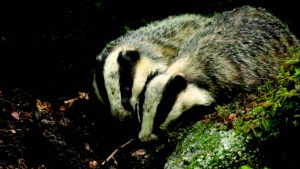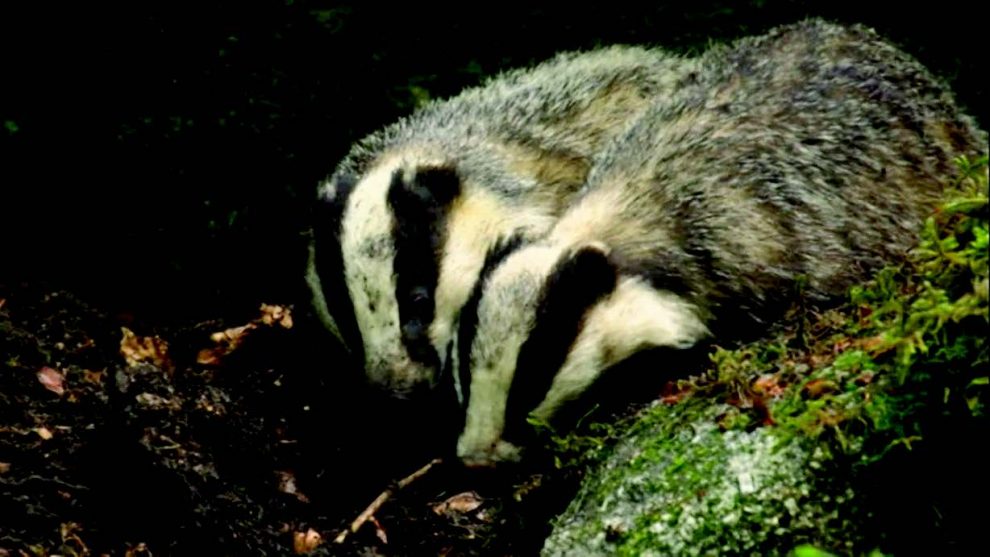
FRUSTRATION and no little anger were the keynotes of the County Council’s debate on a proposal to lobby the Welsh Government to permit a badger cull.
Councillors were told of the toll of the current policy had taken on farms, families, and communities. A packed Council Chamber heard harrowing stories of cattle being slaughtered late in pregnancy, outrage at discovering tests had delivered false positives, and an acknowledgement that there needs to be a broader approach than the one currently used. Proposing the motion, Cllr Gareth Lloyd began by setting out the nature of recent discussions members had held with their counterparts in Carmarthenshire and Pembrokeshire regarding the deepening crisis in west Wales’s agricultural sector.
The dairy and livestock sector, Cllr Lloyd told councillors, was under particular pressure and the incidence of bovine TB (BTB) in the locality, together with the method chosen to deal with it, was making the problem worse. Cllr Lloyd continued by pointing out that BTB was having a ‘devastating effect’ on the wellbeing of animals and humans, while exacerbating ‘the fragility of Ceredigion’s economy’.
He reserved the majority of ire for a direct attack on the Welsh Government’s policy, ‘in light of the complete breakdown of the unscientific vaccination programme’. Stating that it was necessary to ‘break cycle of infection’ Cllr Lloyd told members: “I do not bring this before you without giving a lot of thought. I would like there to be no culling, the truth is there is a culling scheme – but it is happening to cattle! “Official figures show that in Wales 82,500 cattle have been culled. That is more than the population of Cetredigion, to give an idea – and that does not include unborn calves. The experiences of farmers are almost like coming back from war. You have cattle hours away from calving, minutes, before they are culled. Farmer can see the calves moving inside their mothers before the cows are killed.
This is the kind of thing we can avoid. We have spent twenty years culling cattle, and last year the number of cattle culled was 27% up on previous year.” Acknowledging the complexity of the situation, Cllr Lloyd said: “As things stand, this cycle will continue. It is a fact that badgers contract TB and are A (emphasis added) factor, but not the only factor, in infecting cattle. We could carry on culling thousands of cattle every year, but something must be done to stop the root cause of the problem, or at least tackle part of it. I understand some people have strong feelings against this idea, but I am representing my community.”
Cllr Lloyd concluded: “We need to come to an agreement for farmers, families, communities and to cooperate with our fellow councils in west Wales.” Following the formal seconding of the motion by Deputy Leader Ray Quant, Cllr Gethin James congratulated Cllr Lloyd on putting such a compelling case forward. Cllr James continued by suggesting: “The political will to deal with the issue has been lost. In 2008, during a visit to Ceredigion, I remember a discussion about this with the then First Minister, Rhodri Morgan. He told me the evidence was there that a cull would work. “Our own AM, Elin Jones, was leading that. I think she wanted this to move forward. There was a legal challenge and the cull was delayed. Welsh Labour ditched the policy straight after the 2011 Assembly elections.”
Cllr Dai Mason told members that the decision should not even be made by the Welsh Government and that the Council should simply back a policy that allowed farmers to do whatever they thought necessary to protect their own stock. Cllr Towyn Evans was less combative, saying that there were no easy answers, he suggested that: “We are not proposing cruelty, but facing reality. The time has come, in the interests of humanity and people’s livelihoods, to make tough decisions and to make decisions that others will jump on to make political hay. “We are talking about targeting culls where TB exists. There is a genuine need for a political will to look at what’s happening in the dairy industry.” Highlighting the price collapse confronting dairy farmers, Cllr Evans said: “Farmers without contracts are now getting 12ppl for their milk.
That was 34ppl not so long ago. Families have invested in farms, they spend money locally. We must look at getting greater control of this issue. I agree with what Cllr James had to say about political will in the Assembly. There is a primitive system being used to test animals, and the system they are using is not fit for purpose. In this council, a rural council, we must have the will to be brave.” Cllr Dafydd Edwards addressed the issue in a different way and highlighted the loss of biodiversity in the countryside: “Badgers at one time, were endangered and were then protected. There are too many badgers now. It is time to for us to ask to look at lifting restrictions protecting badgers to reduce their impact on other wildlife; there is a lack of diversity thanks to badgers. We should look in more detail to see if there is a more sensible course of action to control their population and to review the impact on other wildlife. Cllr Lyndon Lloyd was very much more cautious than those preceding him: “The Government has accepted a scientific view as the basis for the vaccination programme. We might not agree with the scientific evidence, but if we are to present our own case we need to provide some science of our own.
“ We cannot simply say the process the Welsh Government is using is unscientific without showing why it is. We need to strengthen our case. As we have been debating here, BBC Radio Cymru has asked the Welsh Government for a comment. It claims the incidence is lower and the number of cattle culled is, too. “Vets have accepted the vaccination programme, some with misgivings, and we need to address that. “I can foresee the Assembly sending a letter back to us saying, ‘prove it’.” Responding to Lyndon Lloyd, Cllr Gareth Lloyd said: “We can use their evidence against them. The Welsh Government insisted on a five year programme and said it had to be five years unbroken to be scientifically sound. “They have failed to deliver that. By coming to an end after the fourth year, they have broken that.
Now they say it is fine to wait a year, but cannot say whether it will start again next year.” Cllr Paul Hinch picked up Cllr Lyndon Lloyd’s point: “This last Welsh Government has no about rural life in Wales or anywhere else. Unless vaccination is fully taken up, you cannot build up immunity. It’s not just the money, it’s the way of life. People get very upset about killing ‘cuddly animals’, but if they’re causing a problem they need management. If it takes a targeted cull, because the vaccination programme is incomplete, we should support that.” Cllr Alun Williams told members: “I understand the strength of feeling. I have had lots of emails about this topic. I would point out in England there has been intensive culling but that has not eradicated badgers in the affected areas. “My belief is there is no single simple solution to this and there needs to be a comprehensive science based policy. I cannot support only one solution. I fully support a motion to pressurise the WG to break the cycle of infection.”
His words were echoed by Cllrs John Lumley Hag Harries, who said they would abstain on the basis the evidence was not enough to back the motion. Cllr Peter Evans spoke at the end of the debate in support of the motion and made it clear that he could not support a petition in which one black and white creature was more equal than another. Highlighting the impact of the cull on the rural economy, Cllr Evans told members that: “We have to act, because farmers are the backbone of the rural areas. Farmers’ way of life is extremely important to the rural economies of the three counties. Ask the businesses who depend on them.” In a registered vote, an amendment to the motion to omit the recommendation of a cull only was supported by only 3 members with 4 abstentions. The motion was carried by 26 votes in favour to 1 against with 5 abstentions.

















Add Comment